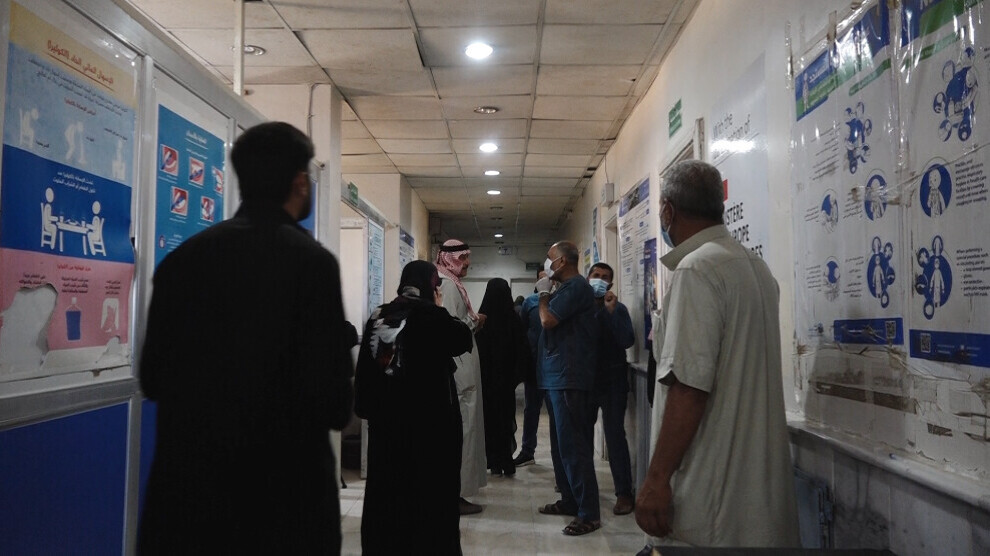HRW calls on Turkey to stop aggravating the acute water crisis in Syria
Parties to the conflict in Syria aggravate cholera epidemic, with Turkish authorities disrupting water supply and Syrian government obstructing aid, says the HRW.
Parties to the conflict in Syria aggravate cholera epidemic, with Turkish authorities disrupting water supply and Syrian government obstructing aid, says the HRW.

Turkish authorities are exacerbating an acute water crisis that is believed to have given rise to the deadly cholera outbreak spreading across Syria and into nearby countries, Human Rights Watch (HRW) said today. All parties to the conflict need to ensure the right to clean water and health for everyone in Syria.
“The Turkish authorities have failed to ensure an adequate water flow downstream into the Syrian-held portion of the Euphrates river and a consistent water supply from Allouk water station, a critical source of water located in an area of northern Syria under their control, to areas held by Kurdish-led forces in northeast Syria. Discriminatory diversion of aid and essential services by the Syrian government as well as ongoing security and access constraints across all of Syria inhibit an adequate humanitarian and emergency response in affected parts of the country,” HRW stated.
“This devastating cholera outbreak will not be the last water-borne disease to impact Syrians if the country’s severe water problems are not immediately addressed, particularly in the northeast,” said Adam Coogle, deputy Middle East director at Human Rights Watch. “Turkey can, and should, immediately stop aggravating Syria’s water crisis.”
The Syrian Health Ministry declared a cholera outbreak on September 10, 2022, with the former UN Humanitarian Relief Coordinator, Imran Riza, calling it a “serious threat to the Syrian people” and to the entire Middle East region. As of November 1, the World Health Organization had recorded 81 deaths from cholera in Syria and more than 24,000 suspected cases. Cholera has since spread to Lebanon, a country enduring multiple crises.
HRW noted that the Euphrates River is the most significant source of water and electricity for northeast Syria and other parts of the country. Since February 2021, Turkish authorities have severely restricted the flow of water to the Syrian-held portion of the river, well beneath the 500 cubic meters stipulated by a 1987 agreement between Turkey and Syria. Earlier, in July 2020, a UN OCHA report on Syria referred to a 65 percent reduction in the rate of water flowing into the Syrian-held portion of the river.
In the past year, Turkey has denied responsibility for reduced water levels, noting that it is facing its own water shortages. However, a report by an international nonprofit organization said that between January and May 2021, as water levels were sharply declining in Syria’s reservoirs and nearly causing significant damage to hydroelectric dams, levels at Turkey’s Atatürk Reservoir, one of several operational dams on the Turkish-held portion of the Euphrates, were climbing.
In the past year, both Syria and Iraq, which also depend on the Euphrates river for much of their food, water, and industry, have pressed Turkish authorities to increase the water levels. Iraq is also battling a grave water crisis and a cholera outbreak.
While countries have signed bilateral agreements, there is no comprehensive or long-term treaty between Turkey, Syria, and Iraq on water sharing, HRW said. Syria and Iraq have long accused Turkey of using its hegemony over the river as a political tool, while Turkey has occasionally insinuated that both Syria and Iraq are, in effect, free-riding on a Turkish resource.
HRW pointed out that, “Turkey is an occupying power in parts of northeast Syria. During its 2019 invasion, Turkey and Turkish-backed forces took control of the Allouk water station, near the town of Ras al-Ain (Serekaniye). The water station serves more than 460,000 people in Hasakeh governorate, and the UN describes it as the only viable water source for Hasakeh city and surrounding areas.
Water pumping at the station, first damaged during the 2019 military operation into northern Syria, has been greatly reduced and repeatedly interrupted, forcing people living in Hasakeh to rely on expensive and unreliable private tanker trucks.
Human Rights Watch documented Turkey’s failure to ensure adequate water supplies from the Allouk station to Kurdish-held areas in Northeast Syria in March 2020, in the midst of the COVID-19 pandemic. At the time, 49 Syrian groups condemned what they described as Turkey’s “intentional interruption of water” at the station.
Russian-brokered agreements between Turkish forces and Kurdish-led authorities to supply water through the Allouk station to communities dependent on it in exchange for providing electricity from areas under the control of Kurdish-led authorities to certain Turkish-occupied areas have repeatedly failed.
One aid worker said that as Turkey inches closer towards connecting areas in northern Syria that it occupies to its own electricity grid, it may no longer face meaningful pressure to continue supplying water from the Allouk station to Hasakeh.